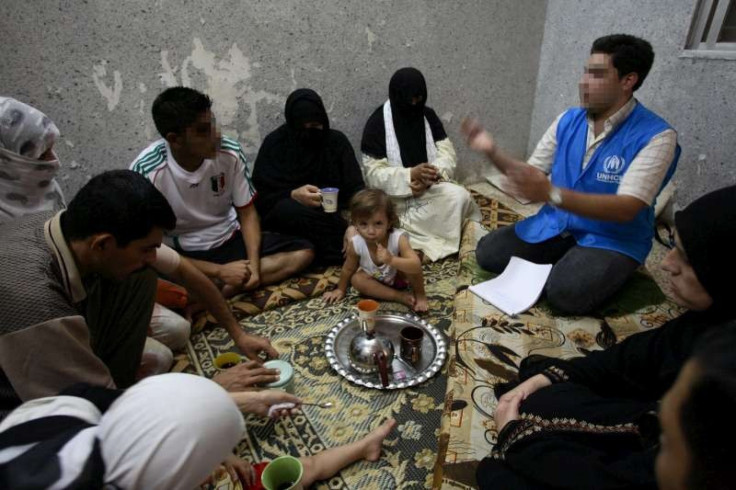Refugees, Twice: Iraqis In Syria Displaced Again By Conflict

Thousands are fleeing Syria as violence brings the country to the brink of civil war, a situation that is doubly traumatizing for Iraqi refugees there who had sought to escape the conflict in their own country.
The U.N. High Commissioner for Refugees (UNHCR) reported Monday that over 10,000 Iraqi refugees in Syria have returned home since last Wednesday in addition to 13,000 during the first half of 2012 as the Syrian military continues to battle opposition forces in major urban centers.
"Many of the returnees have expressed their fear regarding the ongoing risks to their safety in Iraq, but said that they felt they had little choice, given the security threats in Syria," UNHCR spokeswoman Melissa Fleming said in a press conference.
Following the U.S. invasion of Iraq in 2003, hundreds of thousands of Iraqis fled into neighboring countries, particularly Syria due to its proximity, open border policies and relative atmosphere of religious tolerance.
In 2007, the Brookings Institute estimated that there were around 1.2 million Iraqi refugees in Syria, which placed a significant strain on the resources of a country with a population of 18 million. Refugees were given free access to schools and the emergency health care system, among other public services.
While Syrian President Bashar al-Assad's government seemed willing to help the refugees, it has been criticized for ruthlessly suppressing political dissent and repressing a 16-month popular uprising that has groen into a bloody armed conflict.
With the humanitarian situation in Syria worsening by the day, access to these public services has been severely limited in many parts of the country.
There are currently 88,000 registered Iraqi refugees in Syria, though Refugees International said the actual number is closer to 1 million.
The Iraqi government is supporting the return of refugees with dedicated flights and the UNHCR is assisting with additional transport, but thousands will be unable to leave due to logistical issues and safety concerns.
The UNHCR is working with the Syrian Arab Red Crescent to provide humanitarian relief to Iraqi refugees in Syria though access is limited for the aforementioned reasons.
"Getting any kind of aid into Syria right now is a big battle," said Daryl Grisgraber, Refugees International's Senior Advocate for the Middle East and North Africa.
Behind The Violence
The U.N. has estimated that over 10,000 people have died in the Syrian conflict to date, and indeed the violence itself is a major factor driving Iraqi refugees out of the country and back home, but there are also more complex elements at play.
For one, Iraqi refugees face discrimination as outsiders and are perceived as a drain on Syria's resources, especially during a time of widespread social unrest.
There is also an element of religious tension, which mirrors the very circumstances under which many Iraqi refugees fled in their country in the first place.
Many of the Iraqi refugees are Shiite Muslims and Christians who fled during the chaotic height of the Iraq War, fearing retribution from Sunni Muslim extremists after the downfall of Saddam Hussein, also a Sunni, though his authoritarian regime was considered secular.
Similarly in Syria, Sunni militants leading the uprising against Assad, a secular autocrat of the Alawite sect (a Shiite offshoot), may pose a threat to the security of religious minorities among the Iraqi refugees.
"There are signs of religious extremism, and that extremism means they will be against the Shiites," Salim Mohammed Alwan, 45, a Iraqi Shiite restaurant worker who recently returned to Baghdad after living in Syria since 2007, told the Los Angeles Times.
"No one used to ask me about my sect until this crisis began," he added.
Syrian opposition forces, however, have emphasized that their struggle is not sectarian, though hostility is palpable as instances of targeted attacks based on religion continue to surface on both sides of the conflict.
Nevertheless, thousands of Iraqi refugees have decided to take their chances back home, rather than wait to see how the situation in Syria unfolds.
Iraq's stability remains in question as Sunni militants continue to carry out violent attacks against the religious minorities and the Shiite-led government.
Grisgraber said the safety of Iraqi returnees "depends on where they go back to."
"Clearly some parts are unsettled," she added. "The (Iraqi) government will try not to have people go back to those areas."
© Copyright IBTimes 2024. All rights reserved.





















